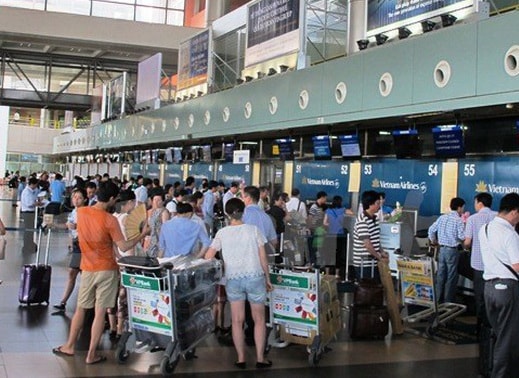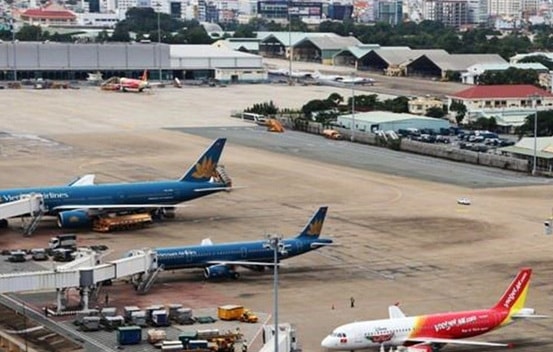Airline tickets increase sharply but not yet at the ceiling
According to the leader of the Civil Aviation Authority of Vietnam, despite the increase in fuel prices, domestic airlines are still selling tickets within the price range declared to the Authority, not exceeding the prescribed ceiling price for air tickets.
Fuel prices increase, airlines make up for losses
Regarding the information about "inflated" airfares, on the evening of October 4, the leader of the Civil Aviation Authority affirmed that the current prices for economy class passenger transportation services are being managed and implemented according to a flexible fare mechanism with a structure of many price ranges on a flight, ensuring that they do not exceed the prescribed maximum level.
According to current regulations, the ceiling price for air tickets from Hanoi to Ho Chi Minh City and vice versa is 3.2 million VND/one-way ticket (the above price is the net price, excluding taxes, fees and other service prices; the price range is applied from September 2015).
According to the airlines' declaration, on average, the above flight route has more than 10 price ranges with the maximum price (excluding taxes, fees and other service prices) as follows: Vietnam Airlines is 3,150,000 VND/one-way ticket; Jestar Pacific 3 million VND/one-way ticket; Vietjet Air 2,870,000 VND/one-way ticket.
“Depending on the market situation, airlines will proactively adjust and apply appropriate price ranges according to the declarations sent to the Civil Aviation Authority. Up to this point, fuel prices have increased compared to 2015, but Vietnamese airlines are still selling tickets within the price ranges declared to the Authority,” the leader of the Civil Aviation Authority emphasized.
 |
In case an airline violates price regulations, the leader of the Civil Aviation Authority affirmed that the competent authority will request to immediately stop applying the violating price and impose administrative sanctions according to the provisions of law.
Mr. Duong Tri Thanh, General Director of Vietnam Airlines said that the ceiling price of air tickets is based on the specific price of oil, airlines rely on input cost prices to evaluate the ceiling price frame. Currently, the airline has no plans to increase prices in 2018.
“The world's aviation industry is unpredictable because it depends on oil prices (current fuel costs are 70 USD/barrel, according to Vietnam Airlines' calculations it is 64 USD/barrel and fuel costs are estimated at 2,500-2,600 billion VND/year). Airlines must have a situation to handle losses by compensating for fuel costs with revenue and profit,” Mr. Thanh added.
According to the representative of the Finance and Accounting Department of Vietnam Airlines, fuel prices increased in the fourth quarter of this year, which is also a common trend of the years, not to mention the risks of exchange rates, interest rates, currency fluctuations... and Vietnam is no exception to this.
“The peak season for aviation business is the first and third quarters of each year. The airline must balance its finances to ensure revenue, but with the market foundation and service quality, it strives to complete and exceed the targets and plans set for the year,” said a representative of Vietnam Airlines.
Flight frequency reduced, no seats for passengers
Referring to the situation of passengers not being able to book seats on the Hanoi-Ho Chi Minh City route recently, the Civil Aviation Authority's report shows that in late September and early October, according to the airlines' operating schedules, there were an average of 47 flights/one way/day (equal to 85.5% compared to the same period in 2016), of which Vietnam Airlines had 25 flights/one way/day (up 8.7%), Vietjet Air had 16 flights/one way/day (down 15.7%), Jetstar Pacific had 6 flights/one way/day (down 53.8%).
In recent days, the number of passengers without seats on the Ho Chi Minh City - Hanoi route has increased, the seat utilization rate of airlines on this route has reached approximately 100%, the number of passengers booking seats on the system for the following days is also at a high level.
 |
“The main reason for this situation is that Jetstar Pacific had to cancel a series of flights, mainly on the Ho Chi Minh City - Hanoi route due to a lack of resources, especially pilots. Vietjet Air also reduced its operating frequency from an average of 25 flights/one way/day to 16 flights/one way/day due to scheduled maintenance of its aircraft and increased international charter flights,” the leader of the Civil Aviation Authority explained the flight delays and cancellations.
Faced with the above situation, in order to meet the travel needs of passengers, the Civil Aviation Authority of Vietnam has directed airlines to allocate all resources to increase flights.
Specifically, in the period until mid-October, Vietnam Airlines has planned to increase the average of 2-3 flights/way/day between Ho Chi Minh City and Hanoi, and at the same time change to larger aircraft on some other regular flights.
Vietjet Air has planned to increase 4-5 flights/direction/day to an average of 20 flights/direction/day from Ho Chi Minh City - Hanoi from the second week of October.
During the period until mid-October, due to resource difficulties, Jetstar Pacific has not been able to increase flights on this route. The airline has been closely coordinating with Vietnam Airlines to ensure transportation so as not to affect passengers due to flight reduction. From 15 to the end of October, the airline plans to operate stably on this route with a frequency of 6-7 flights/direction/day and maintain a frequency of 8-9 flights from November.
According to VNN
| RELATED NEWS |
|---|

